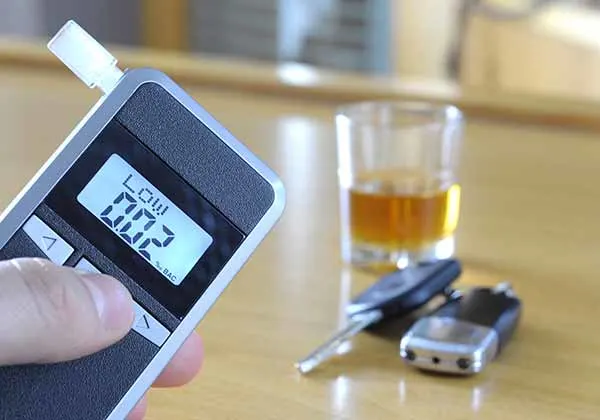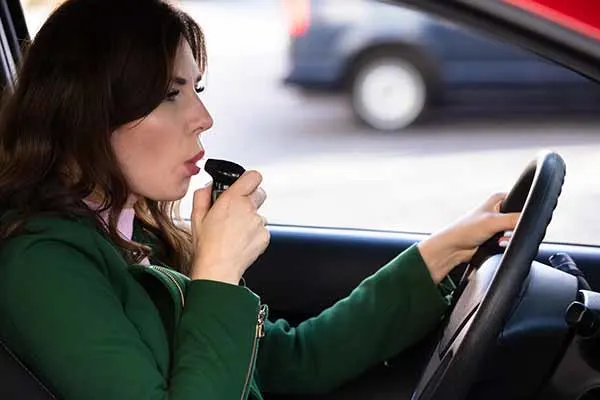If you operate a motor vehicle in Illinois roadways, you agree to take a breathalyzer test when requested. You don’t have the right to speak to an attorney before breathalyzer testing, but you can refuse to take the test. If you refuse to take a breathalyzer, your driver’s license will be suspended. Your driver’s license will also be suspended if you take a breathalyzer, and the chemical test shows that your blood alcohol content (BAC) is above the legal limit. The law enforcement officer may also request a blood test or urine test.
A breathalyzer test is done with a small machine, which has a tube on it. The law enforcement officer will request you to blow into the tube. The device will then detect how much alcohol is in your system.
Under What Circumstances Will a Breathalyzer Test Be Requested in Illinois?
A law enforcement officer is authorized to ask a motorist to take a breathalyzer if there’s probable cause to believe the driver is driving under the influence of drugs, alcohol, intoxicating substances, or any combination thereof and the driver:
- is arrested for drunk driving or
- was involved in a fatal motor vehicle accident or caused personal injury to other motorists.
The law enforcement officer has the mandate to decide whether to administer blood, breath, urine or other bodily substance tests.
What Happens in Illinois if You Refuse to Take a Breathalyzer Test?
A driver who refuses to take a breathalyzer is subject to an administrative license suspension, which is also referred to as a “statutory summary suspension.” A driver who refuses a chemical test is also ineligible for a driving permit or hardship license during the license suspension and is also liable for the costs of a blood test. Further, the evidence of breathalyzer refusal can be used against them in a criminal drunk driving case.
The Illinois Secretary of State (SOS) will automatically suspend a driver’s driving privileges for refusing to take a breathalyzer. The license suspension periods include:
- One year, if the driver doesn’t have a previous statutory summary suspension or DUI conviction within the last five years, and
- Three years, if the driver has a previous statutory summary suspension or drunk driving conviction with the last five years.
The statutory summary suspension will take effect on the 46th day after the date you received the notice. Typically, the police officer will take possession of your driver’s license at the time of the DUI arrest and then issue you with a 45-day driving permit.
Learn More: What to Do After You Get a DUI
Typically, a first offender whose driver’s license has been summarily suspended can get a driving permit. As long as their car is installed with a breath alcohol ignition interlock device (BAIID), the driving permit allows you to drive your vehicle for any purpose and at any time during the statutory summary suspension period. However, persons who refused to take a breathalyzer are ineligible for a driving permit.
A driver who is subject to a breath test might be liable for the expense of a blood test of up to $500 if:
- You refused to submit to a breathalyzer, or
- There’s probable cause to believe the blood test would disclose the use of alcohol, drugs, or intoxicating substances.
However, the driver is responsible for the costs of the blood test only if they’re convicted of intoxicated driving in court.

Another legal consequence of refusing to take a breathalyzer is that the prosecution can present evidence of breathalyzer refusal in your criminal case if you’re on trial for drunk driving. This allows the prosecution to suggest to the jury or judge that the chemical test refusal is evidence of the offender’s guilt. This means that the prosecution may argue that you refused chemical testing to conceal evidence of impairment.
What Happens After Refusing to Take a Breathalyzer in Illinois?
Several counties in Illinois can now secure a warrant for a blood test from their patrol vehicles. Then, police officers will take offenders to a hospital where the blood test will occur. The same is true for persons who suffer severe personal injuries because of a traffic accident, too.
Essentially, the need for evidence of blood alcohol concentration (BAC) overrides your constitutional rights. Many DUI criminal defense attorneys take issue with these new procedures.
Related Content: How to Beat a DUI in Illinois
Some feel individual rights are in question, but judges argue fatality and personal injury rates from alcohol use are the reason for strict rules.
What Will the Criminal Court Do After You Refuse To Take a Breathalyzer?
Many people who refuse to take the chemical test believe there will be no evidence against them, so a drunk driving conviction cannot happen. The truth is, the prosecutor might have more evidence.

A law enforcement officer will pull over a driver that’s disobeying traffic laws. If they suspect the driver may be driving under the influence of alcohol or drugs, they’ll administer field sobriety tests, including a one-leg stand test. It’s only then that the police officer may ask you to take a breathalyzer.
All the activity leading up to a DUI arrest is evidence, and the prosecution has the burden of proof in many criminal cases. There may be audio or video evidence, witness testimony, or driving records.
FAQ: What Happens if I Refuse a Field Sobriety Test in Illinois?
The mere fact a driver refuses to take a breathalyzer test will be recorded, too. This evidence can make the situation worse for some drivers.
Contact a Knowledgeable Chicago DUI Lawyer From Dohman Law Group
Our skilled DUI criminal defense attorneys have extensive experience defending drivers charged with intoxicated driving throughout Illinois. If you have been arrested for driving under the influence of alcohol or drugs, call our criminal defense law firm today at 847-359-4005 for a no-cost initial consultation. Our DUI attorneys frequently represent DUI offenders throughout Cook County, Kane County, Kendall County, Lake County, DuPage County, and throughout Illinois and we can help you beat your DUI criminal charges.


